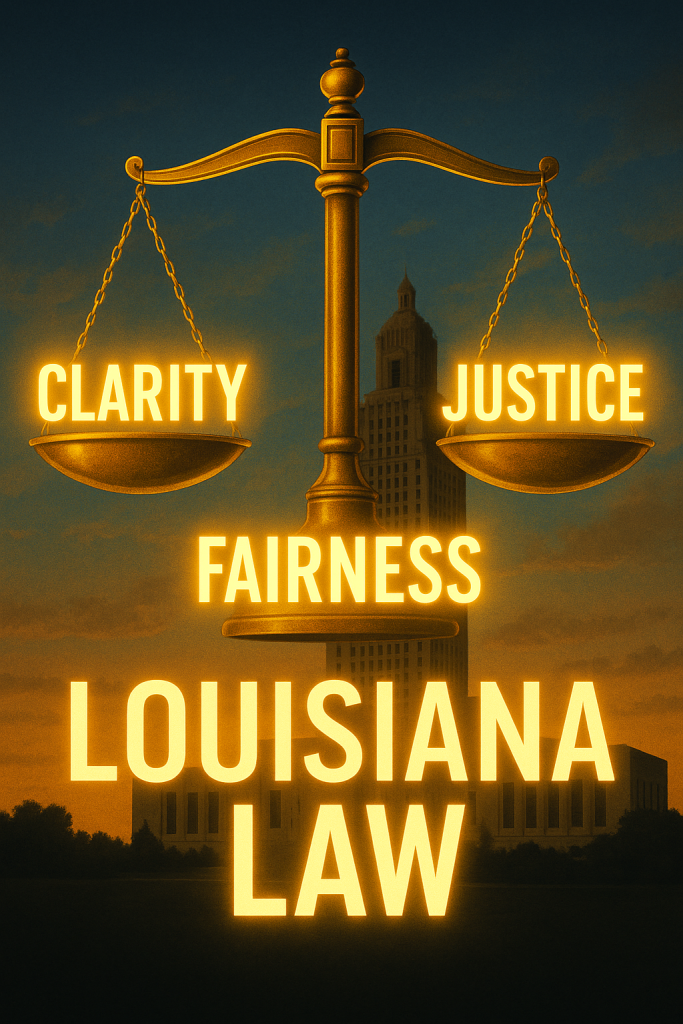 Have you ever wondered how judges and lawyers determine what a law truly means? While legal interpretation can sometimes seem complex, Louisiana’s Civil Code gives clear guidance for when the meaning of a law is straightforward.
Have you ever wondered how judges and lawyers determine what a law truly means? While legal interpretation can sometimes seem complex, Louisiana’s Civil Code gives clear guidance for when the meaning of a law is straightforward.
Understanding these principles can empower you as a citizen and help you recognize how laws affect your rights. Today, we’re exploring Louisiana Civil Code Article 9 — one of the key provisions defining how laws are interpreted and applied in our state.
The Heart of the Matter: What Louisiana Civil Code Article 9 Says
Art. 9. Clear and unambiguous law
When a law is clear and unambiguous and its application does not lead to absurd consequences, the law shall be applied as written and no further interpretation may be made in search of the intent of the legislature.
This simple yet powerful rule emphasizes clarity, fairness, and predictability in Louisiana’s legal system. It directs courts to apply laws as written — no speculation, no guesswork — unless doing so would produce an absurd result.
Breaking It Down: What Article 9 Really Means
1. “When a law is clear and unambiguous…”
This is the starting point for every legal interpretation in Louisiana.
If a law’s wording is straightforward and its meaning obvious, there’s no need for creative interpretation. Judges must follow the plain meaning of the words as written in the statute.
2. “…and its application does not lead to absurd consequences”
This part prevents overly literal interpretations that could cause unfair or unreasonable results.
For instance, if a law’s wording seems clear but applying it exactly as written would clearly contradict justice or common sense, courts can consider that an “absurd consequence.”
3. “The law shall be applied as written…”
This is the core command of Article 9. Judges are bound to apply clear laws directly, without adding their own interpretations or assumptions.
4. “…and no further interpretation may be made in search of the intent of the legislature.”
This final clause underscores Louisiana’s commitment to textual clarity. Courts don’t look for “hidden meanings” or “unspoken intentions” if the text already says it plainly.
If lawmakers intended a different meaning, it’s their job to revise the statute — not the court’s job to reinterpret it.
Why “Clear and Unambiguous” Matters
Article 9 ensures stability and fairness in Louisiana’s legal system. Citizens, businesses, and lawyers can read the law and know what it means without worrying about arbitrary reinterpretation.
It also encourages legislators to write laws carefully — because their words are what ultimately govern.
In short, Article 9 promotes accountability, transparency, and trust in how laws are applied.
When Laws Aren’t Clear
Of course, not every law is simple. Ambiguities arise, and courts may need to interpret unclear language using other Civil Code principles — such as Article 10 (laws interpreted according to their meaning) and Article 11 (words given their generally prevailing meaning).
But Article 9 reminds us that such interpretation is a last resort, not the first step.
Navigating Louisiana Law with Confidence
Article 9 embodies a simple but vital truth: when the law is clear, it means what it says.
Still, understanding whether a law is truly “clear and unambiguous” often requires legal expertise. That’s where professional guidance comes in.
Need Legal Guidance?
If you’re facing a legal issue and unsure how Louisiana law applies, our team at Berniard Law Firm is here to help.
We can interpret how the Louisiana Civil Code — including Article 9 — affects your rights, obligations, or dispute.
Contact us today for a consultation and learn how clarity in the law can protect you.
Other Berniard Law Firm Articles on the Louisiana Civil Code:Legislation vs. Custom: Unpacking the Foundations of Louisiana Law
an Louisiana Law: Absence of Legislation or Custom — Understanding Civil Code Article 4
 Louisiana Personal Injury Lawyer Blog
Louisiana Personal Injury Lawyer Blog

